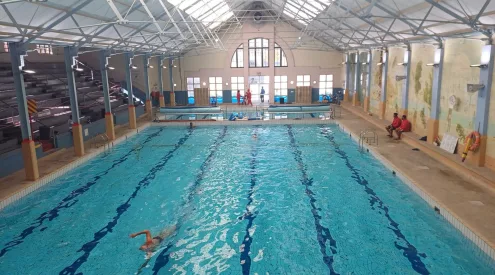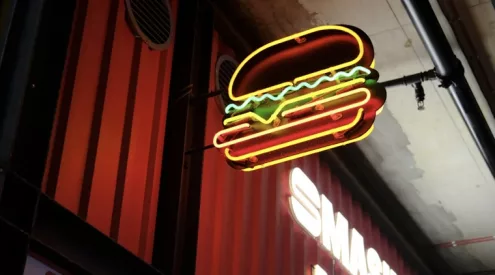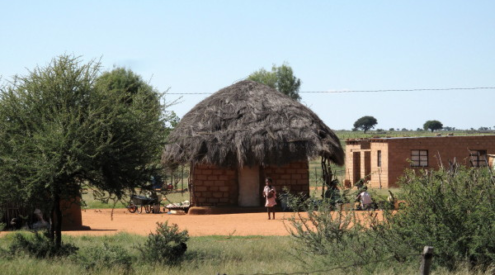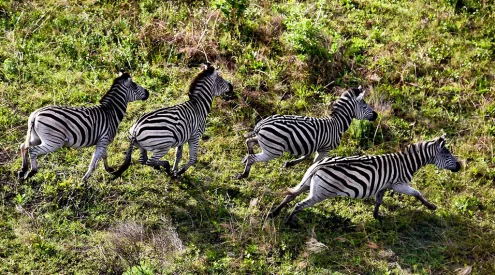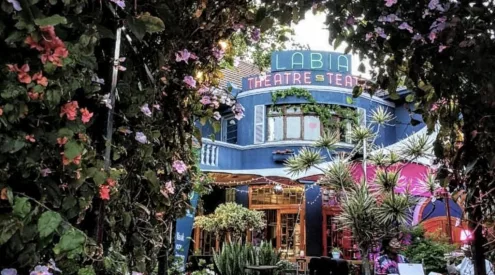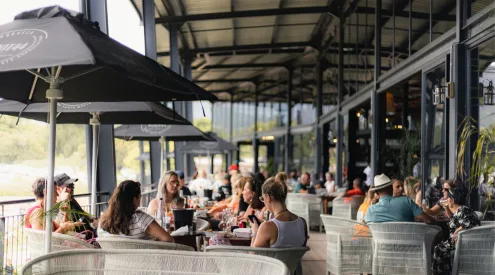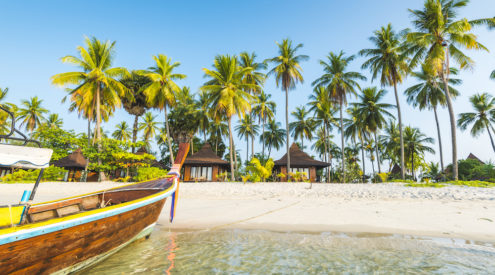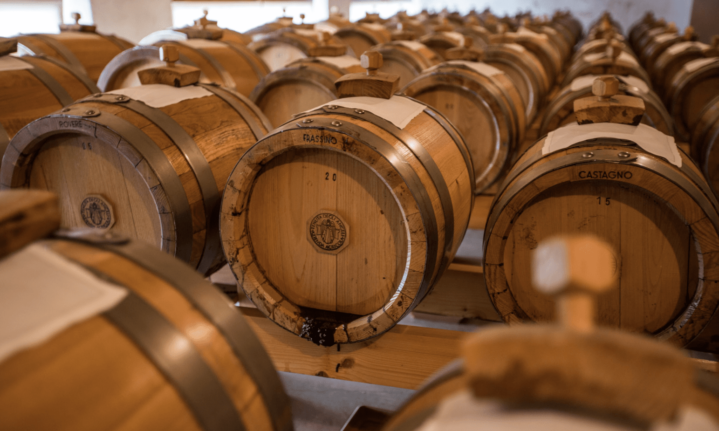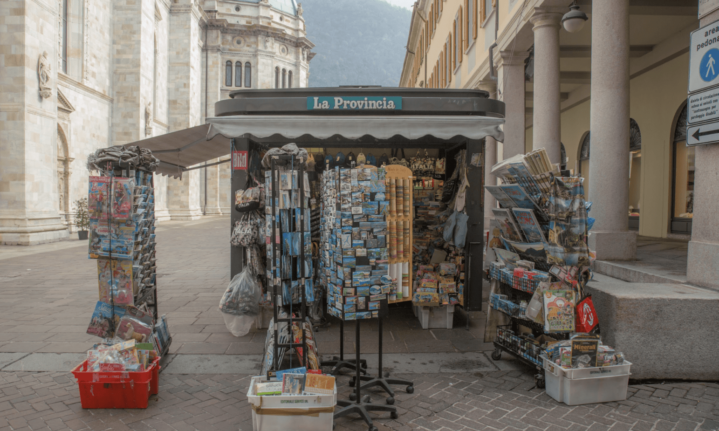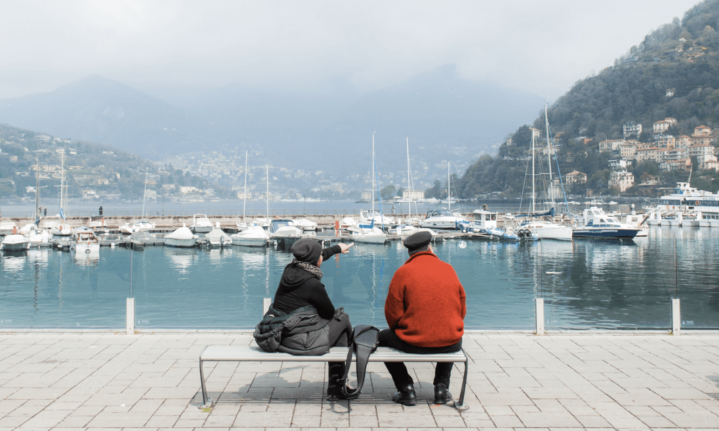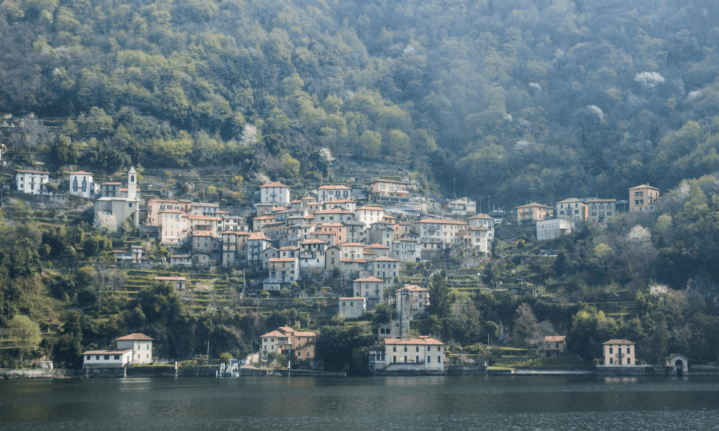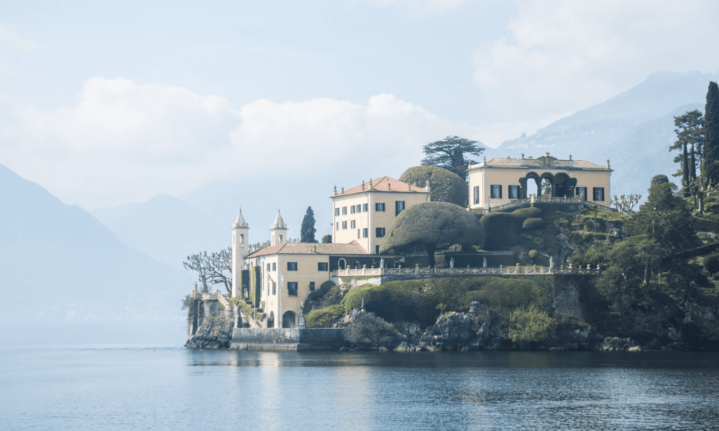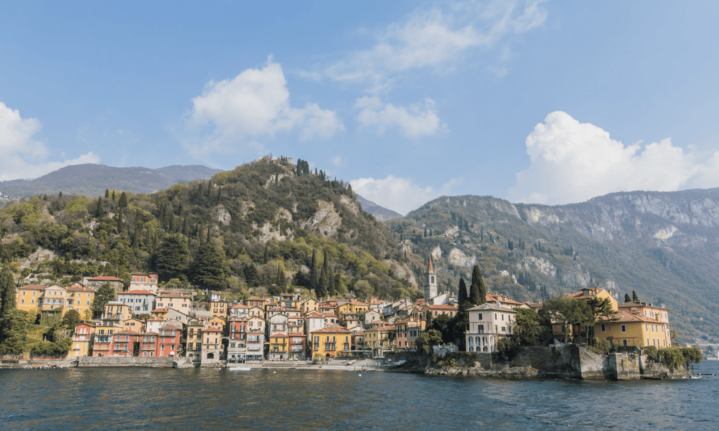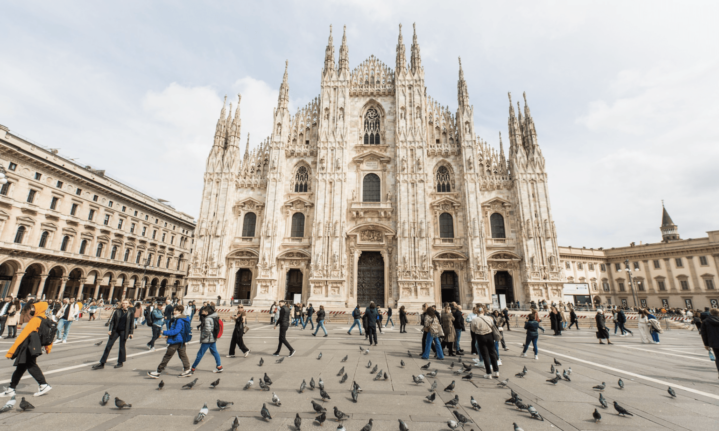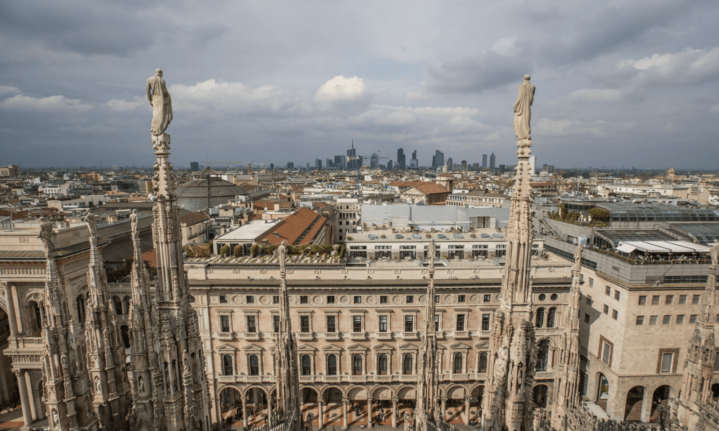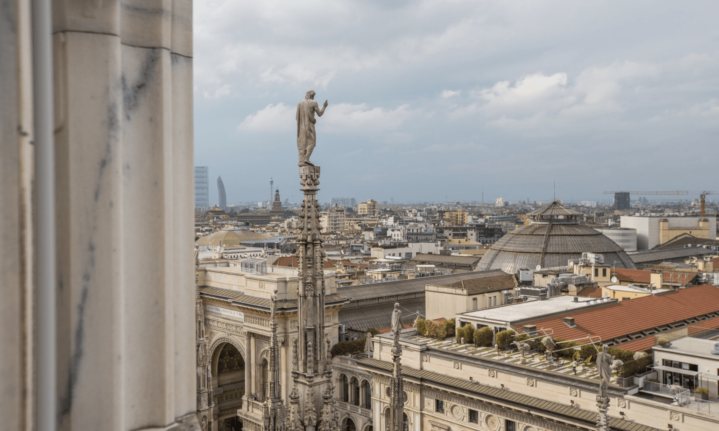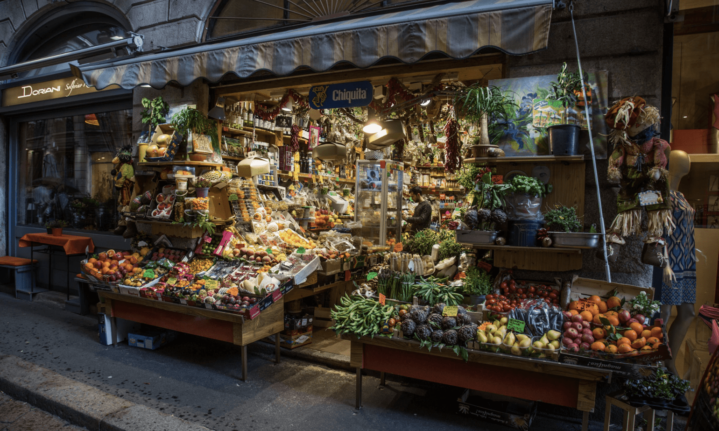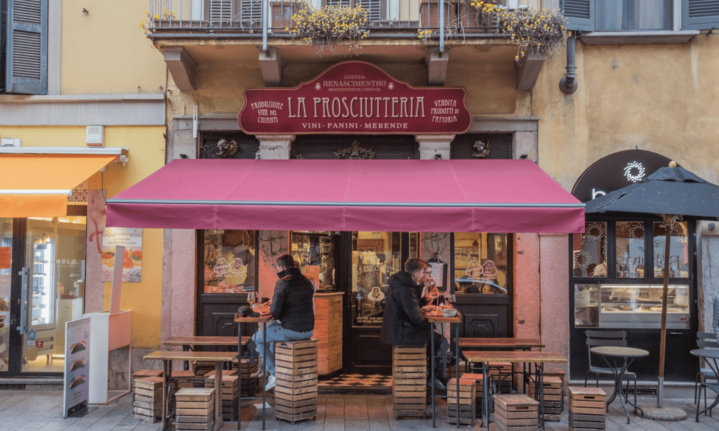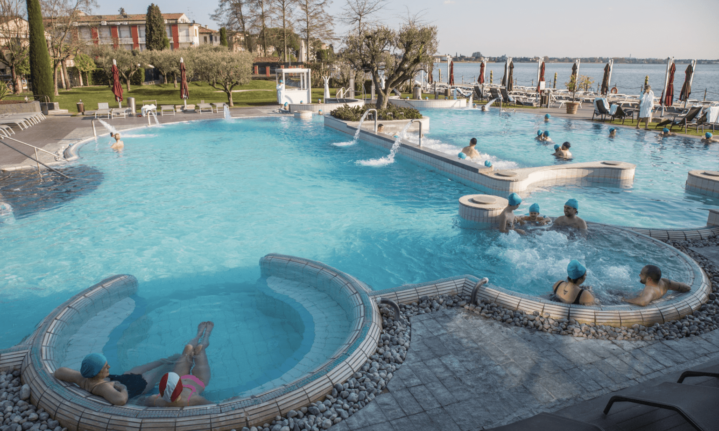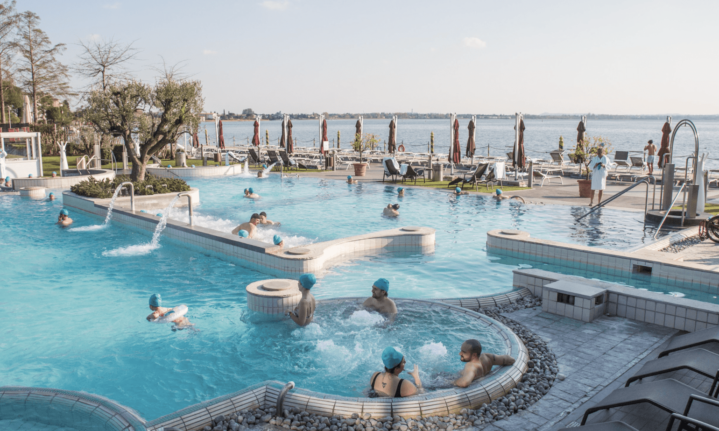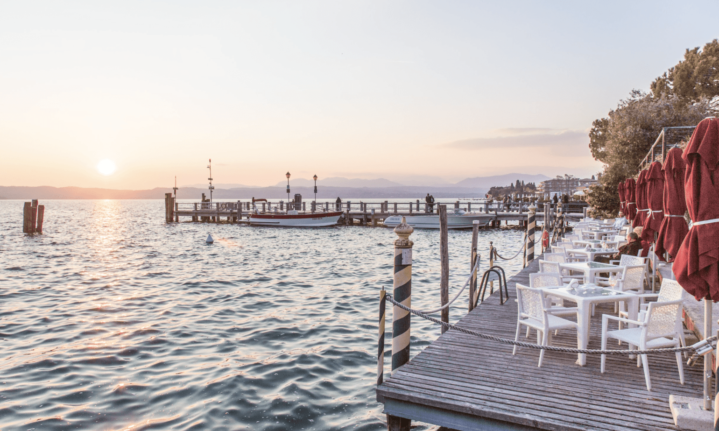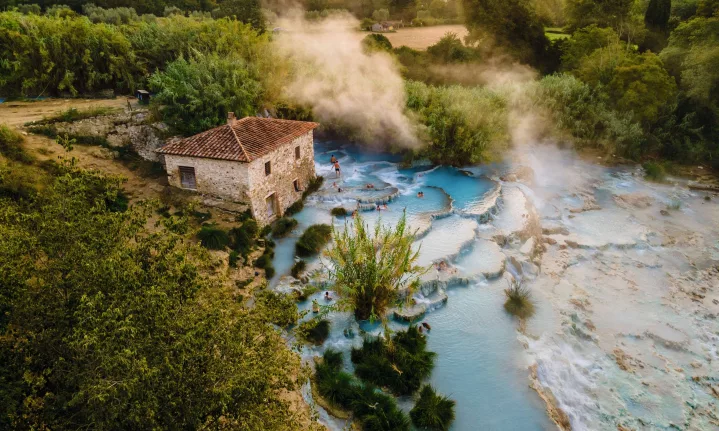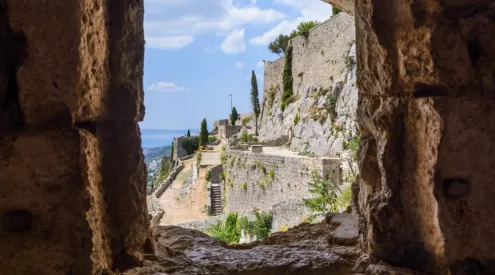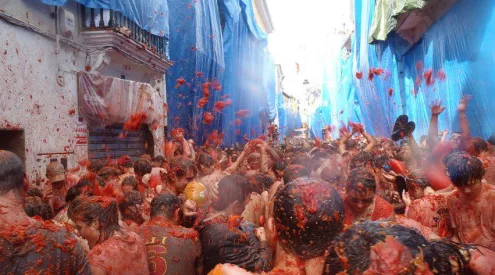I’m lying on a bed of bubbles in a Jacuzzi the size of an Olympic swimming pool, alongside Lake Garda, jiggling like a mound of jelly in a Golden Arrow bus and thinking… absolutely nothing.
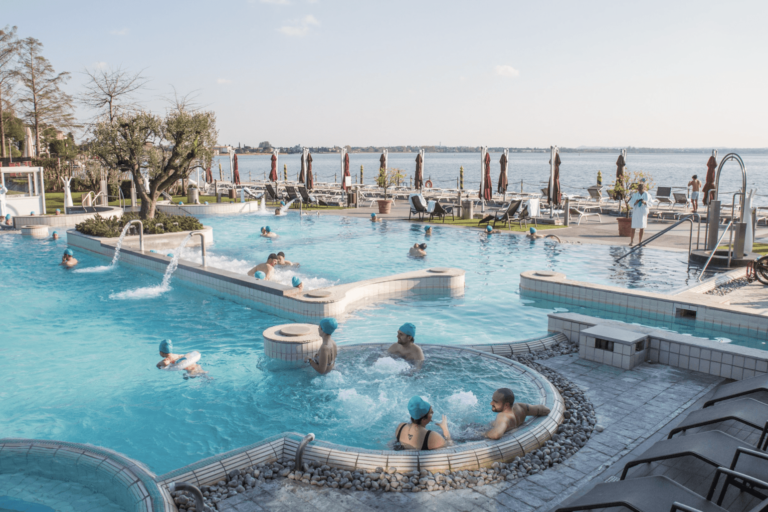
The hot water and onslaught of bubbles has sent me into a blissful state of thoughtlessness, free of any longing or desire, barely conscious. I’m simply a quivering piece of meat with two eyes, a nose and a pasta hole. A lump of perfect lake-side contentment, I’m surrounded by other bathers in blue swimming caps and smug smiles who share in my crazed delight. They float past me serenely while classic rock plays softly on the speakers.
The outside pool has a number of stations. Apart from the hydrotherapy bed I’m draped over like an autopsied crab, there are the jets shaped like swan necks, aromatised rainbow showers, whirlpools and vascular circuits. If I were able to summon the energy to move, I could visit the indoor and outdoor saunas, steam baths, mud treatments, multisensory relaxation areas and massage rooms. As it is, I cannot even muster the energy to think of moving.
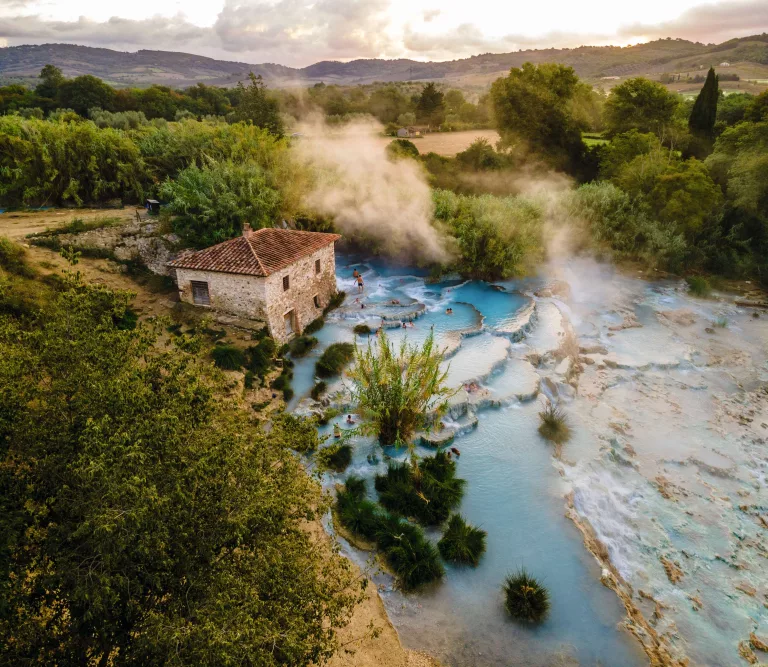
At the pool’s edge, bathers in white robes recline on loungers vacantly staring at the storybook scene. The thermal baths, or terme as the Italians call them, are just a towel’s toss from Lake Garda’s waters, Italy’s largest lake. A short distance from my bubble bliss, elegant speed boats with tiny flags on the back zoom past, narrowly missing families of hard-paddling swans.
Snow-capped mountains rise in the distance, towering above vineyards, olive groves and lemon trees, ‘so deep and intermingled one with the other, as to appear like an immense forest’, as one local poet wrote. Rivers, products of the snowy peaks, cascade into the lake in torrents.
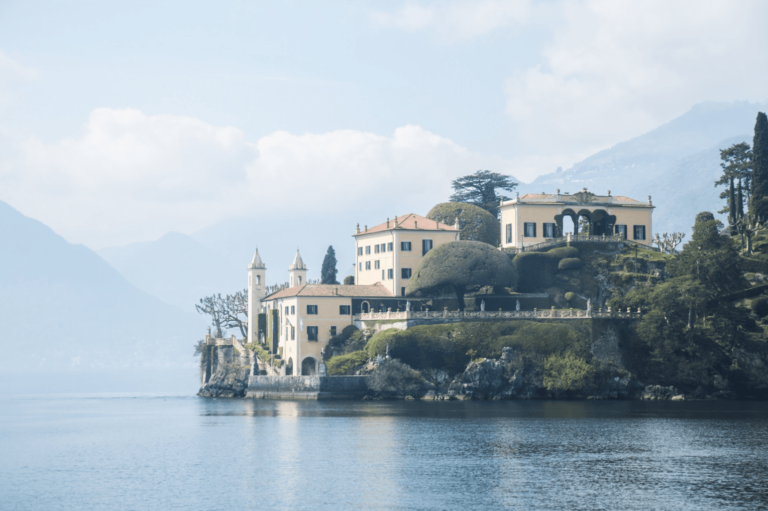
We’re on a thin sliver of land, a promontory that extends 4km into Lake Garda, called Sirmione. The entrance to the peninsula is lorded over by a 13th-century castle that was constructed in the water and is said to be home to a phantom with a broken heart. At the furthest end of the promontory is an archaeological site with ruins of a Roman villa dating back to the first century. Catullus, the poet of love, lived there. There’s also the villa where the famous soprano singer Maria Callas lived. She probably enjoyed the odd submersion, too. The waters are certainly fit for a diva.
Fire in the hole
The thermal spring of Sirmione has been known since the Renaissance. It was only in 1889, though, when the exact source was located. A Venetian diver named Procopio, wearing an enormous diving suit sent from London, plunged into Lake Garda in search of the source of the warm water everyone spoke of.
With a large crowd on the lake’s edge, Procopio was rowed 300m from the shore and plunged in. He followed the bubbles to a depth of 20m and struck his pick. A jet of water shot past him and burst five metres above the surface, amid great applause from the assembled onlookers. As he emerged, Procopio exclaimed: ‘It’s not water, it’s fire!’ The diver was celebrated as a hero and remains today the symbol of a discovery that gave the entire district a bright future. The water, it was later determined, springs at 69°C and is cooled down to 36°C for bathers like myself to enjoy comfortably.
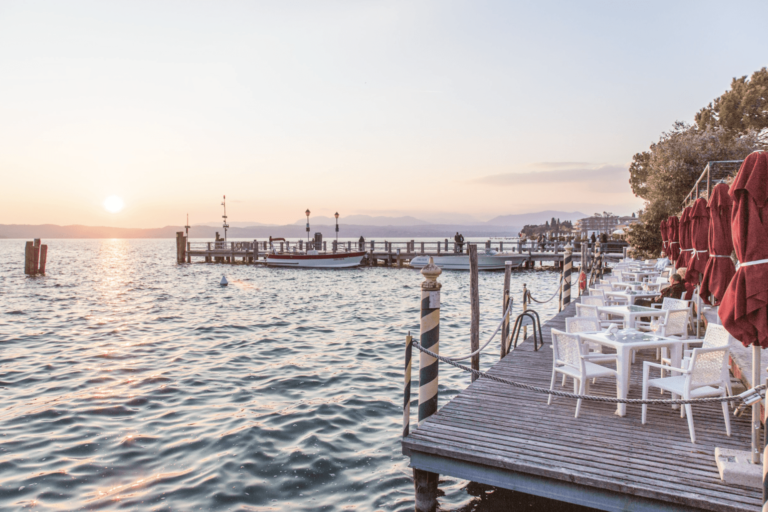
After an extended soak – my skin smooth and soft, my mind at ease – I thanked Procopio for his bravery and floated back to the hotel, stopping to eat a gelato on a bench overlooking the lake as the shadows grew long and softened behind me. I was on a tour of thermal baths arranged by the Italian Trade Agency, and so joined a multi-national group of influencers, journalists and tour operators in the hotel that night.
While basking in our post-soak glow, we dined on a set menu of veal carpaccio on valerian salad, passion fruit drops, pecorino flakes and rocket salad, risotto creamed with pesto, cruditè prawns, tomato cream and cuttlefish ink powder, and trout fillet with onion, anchovies, capers, parsley and green beans with olive oil and lemon juice. I think it’s safe to say we all went to bed feeling lazy and satisfied that night.
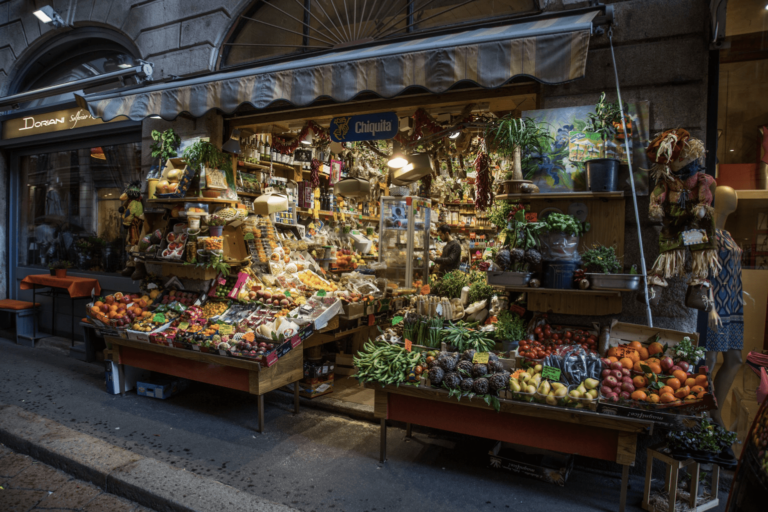
When in Rome
Italy’s land is like its people: hot blooded, thin skinned and prone to blowing a gasket now and then. Just think of its soccer players, artists and volcanoes. Maldini, Pavarotti and Mount Vesuvius are part of Italian identity. As are the country’s thermal baths.
The practice of soaking in hot water may have been born in ancient Greece but the Romans were responsible for its golden age when the baths became a social experience for everyone. The word “spa” is a Latin acronym and stands for Sanus Per Aquam, which means “health through water”. In 354 AD, almost 1 000 bath houses were listed in Rome alone. The largest public bathhouse could hold 3 000 people in its pools at one time and was surrounded by gardens, theatres, markets and libraries.
The Romans believed water and healing to be the work of the gods. They built baths wherever they made conquests – archaeologists have discovered Roman spas of monumental proportions throughout Europe and North Africa, the most recent found in 2008 in southern Siberia. Roman legionaries, fatigued by wars, used to relax and treat their wounds in the natural spring water. The pools in Bath, England, were built for just such a purpose.
Mostly, though, the bathhouses were places for Romans to relax, heal, socialise and gossip. Many popes extolled their virtues and the Emperor Commodus liked bathing so much he visited as often as eight times a day.
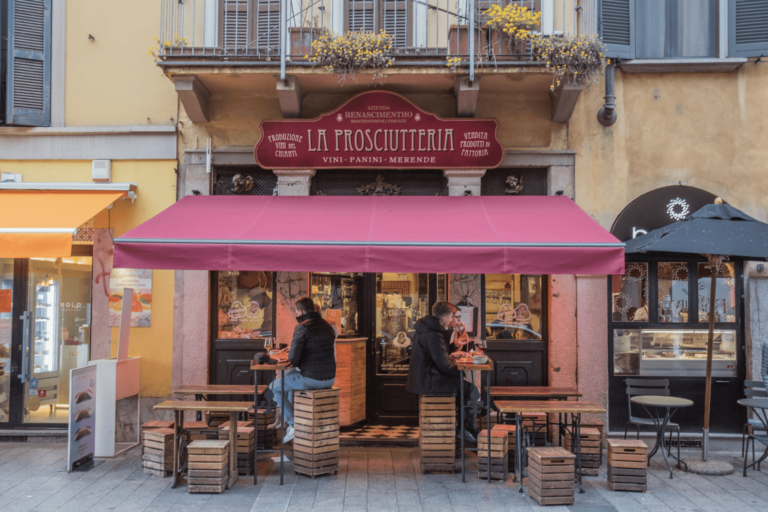
Nowadays, health and wellness is a rapidly growing sector of the tourism industry – good news for Italy’s more than 300 bath houses. In November last year, the Italian government decided to offer free steam baths and volcanic mud treatments as part of a scheme to revitalise the economy. More than one million requests for vouchers were received, mainly coming from citizens who’d never visited a thermal bath before, and caused the website to crash. Nonetheless, some 265 000 applicants got their hands on spa vouchers worth €200 (R3 370) each.
‘It’s been an extraordinary success and a really efficient way of relaunching the thermal bath business as well as stimulating the economy, since a euro spent at a bath means another six spent on local restaurants and accommodation,’ said Massimo Caputi, the head of Federterme, a thermal baths lobby group. ‘Thermal baths help damaged lungs so are also perfect for ex-Covid sufferers.’
Our tour group left Sirmione the next day bound for other termes in Lombardy, a province of mountains and lakes below the Swiss border. At Rivanazzano Terme, we were given a tour of the premises and witnessed the peculiar “inhalation treatments”. These involve the patient putting on a bib and sitting at a station where warm vapour is unceremoniously blasted at their face. I imagined it might not feel too different from a good ocean rinse.
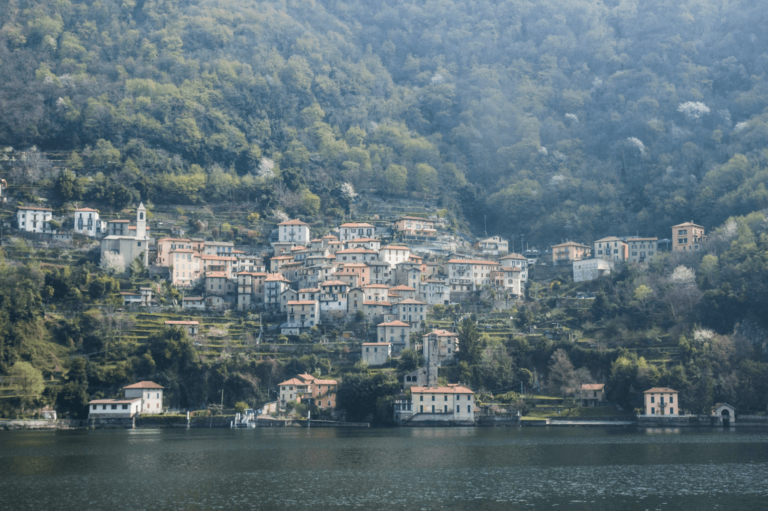
Said to relieve breathing problems and help with inflammation of the respiratory tract, such as chronic sinusitis or bronchitis, such treatments are heavily subsidised by the Italian health service – provided inhalations are prescribed by a doctor – and 12 days of treatment are required. I decided to stick with the saunas and hot baths.
At Terme di Vallio, we learnt just how much Italians love their drinking water. Vallio is more of a wellness destination than merely a thermal bath, known for its landscape, air and the quality of its drinking water. We met Sergio Berardi, the CEO of Acqua Castello, whose grandfather fixed his kidney problems with the water. ‘You should choose water like you do wine or anything else you put in your body,’ he told us. Well, Italians certainly have the option to do that – there are about 600 different bottled waters in the country.
Post-soak buzz
After three days of floating and feeding, the tour came to an end, leaving me with a few days to explore Milan and Lake Como on my own. If Rome was the city of the ancients, Venice the city of sea-dominating merchants and Florence the city of the Renaissance, Milan is the city of today. Italy’s financial and fashion centre, it’s a fast-paced hub of black leather jackets, standing espressos, Aperol spritz and risotto instead of pasta.
It’s also a city for walking and, with a map in hand, I did just that.
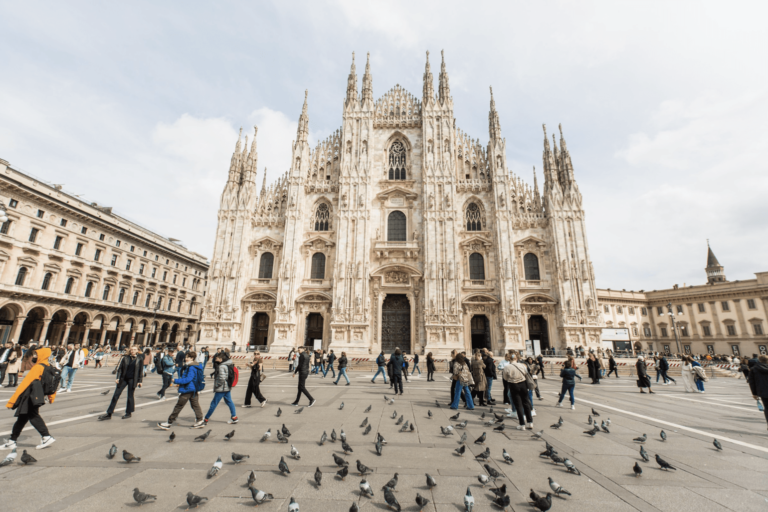
Milan’s cathedral, the Duomo, is not just another church – it’s one of Europe’s most impressive constructions that took 600 years to build and aptly reflects the city’s creativity and ambition. There’s plenty to see inside, too, while the view from the roof, surrounded by 135 spires, is the best in the city. I studiously ticked off the other attractions: the opera house La Scala, the shopping district, the parks, the castle and Navigli District. And I marvelled at small delights along the way such as an old newspaper stand that had been converted into a tiramisu bar, the trendy neighbourhood of Brera and riding the vintage trams.
Two days in Milan was the perfect chunk of time before capping off my Italian tour at Lake Como, where parts of the 2006 Bond movie Casino Royale were filmed.
Como really is the most “James Bond” of the Italian lakes, and many of the fancy lakeside hotels have a 007 price tag, too.The imposing mountains that rise steeply from its shores provide the lake with a sense of drama, while the attractive villages – such as Bellagio, Varenna and Como – bestow it with charm.
I spent the day catching ferries between the villages, walking on the cobbled streets past lovers sitting on benches, heads resting on each other, staring silently across the lake. As I took my own seat, with a lemon and chocolate gelato in hand, I realised there’s a reason Italy is one of the world’s most popular destinations. Sure, there’s the incredible food, art, history and nature. But there’s also the iconically Italian concepts of la dolce vita and la bella figura. Italy is sexy and stylish, offbeat and proud. A land of opera, lemon-tree sunsets, raven-haired girls and – of course – hot-bubbled rapture. I took another lick. Sweet mother of Dante, I whispered to myself, they’re really on to something.
Italy’s Most Famous Terme
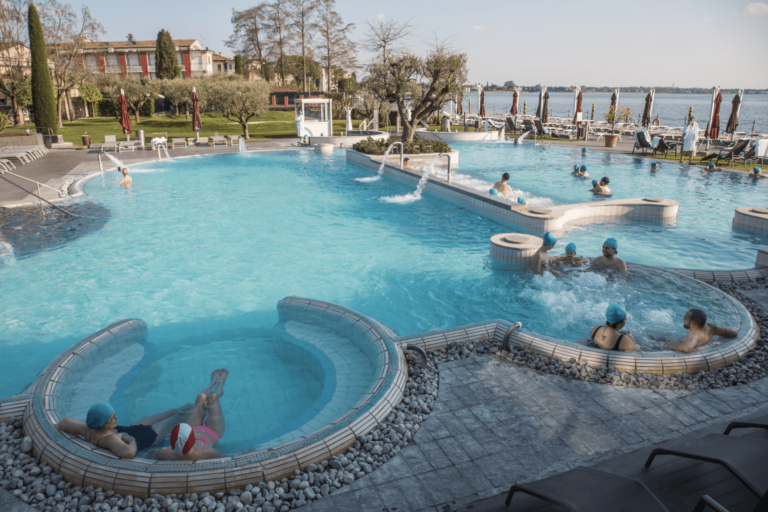
Sirmione (n Italy, between Brescia and Verona)
This town is as famous for its thermal baths as it is for the beauty of its medieval village. Located on Lake Garda, the baths are fed by an underwater spring that bursts through the lake’s crust at 69°C but is cooled down to 36°C for bathers to enjoy comfortably.
termedisirmione.com
Saturnia (central Italy, 170km n of Rome)
Legend has it that Saturn, the Roman god of harvest, first created the springs to pacify mankind. He did a good job. With water bubbling over ivory-white boulders and spectacular panoramic views of the Tuscan landscape, this is the most picturesque of all Italy’s spas. The waters flow directly from a crater of volcanic origin and have been in use since the Etruscan era. termedisaturnia.it
Ischia (an island off Italy w coast, right near Naples, central to s Italy)
A popular Italian pasta sauce is called mari e monti – seas and mountains – which could easily have been inspired by Ischia. The island, easily accessible from Naples, is of volcanic origin. Thermal waters bubble up from under the surface of the waters near black-sand Maronti Beach and feed into a number of famous spas on the island.
Bagni di Bormio (far n, very close to Swiss border)
Sitting on the alpine slope of Mount Reit, the medieval hamlet of Bormio is particularly noted for its winter sports and hot springs with temperatures around 40°C. The charming 1 000-year-old baths feature a pool in an ancient Roman tunnel and provide a spectacular panorama of the snow-capped western Dolomites. qcterme.com
Piscine Carletti an hour outside Rome
Set in the countryside an hour outside Rome, this network of thermal pools is loved by locals, who voluntarily maintain them, and offers a more authentic Italian bathing experience. There’s no fee to visit, and you can spend hours wallowing in the pools – the hottest one (58°C) trickles straight down from the source while the outer pools are cooler.
Stay Here
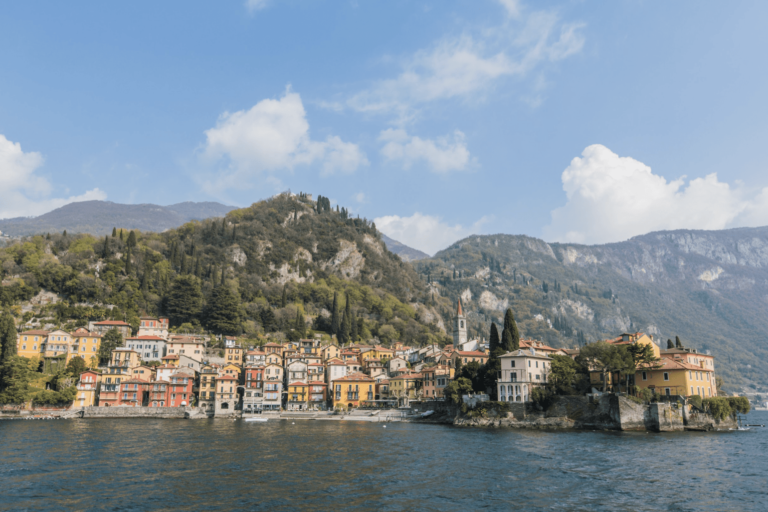
Hotel Sirmione
About 200 metres from the preserved Scaligero Castle, this four-star hotel overlooks Lake Garda. A stay includes access to spa therapy and a swimming pool.
From R1 015 pp pn
+39 030 990 4922
Hotel Rizzi Aquacharme
A partner hotel of Terme di Boario, this hotel is close to the Italian Alps. Its Classic Rooms are simple yet elegant with beautiful views of the mountains.
From R1 260 pp pn
+39 036 453 1617
Ibis Milano Centro
Smack-dab in the middle of Milan, a short walk from the central train station and an ideal base from which to explore the city, the lounge-bar at this hotel is open 24 hours a day and the LineaUno Bistro restaurant serves lunch and dinner.
From R1 010 pp pn
+39 026 3151
Do This
Bathe like Procopio
Terme Sirmione has a vast array of spa treatments on offer, beyond just the hot baths. One of my favourites is the sauna in a shipping container on Lake Garda’s edge.
From R820
Bathe under the Alps
Terme Boario has indoor and outdoor thermal baths near the Swiss border. Treatments on offer include mud therapy, inhalation treatments, massage therapy and physical rehabilitation therapies. The Boario thermal baths also have a beauty centre with body treatments, a spa with a Finnish sauna, a Turkish bath and a salt room.
From R500
Admire the spires
The Duomo is Milan’s extravagant Gothic cathedral. Its pearly white facade rises like a fairy-tale tiara, wowing the crowds with its extravagant detail and the incredible story of its construction. R285 for entrance to the cathedral and roof. duomomilano.it
Test your vocal range
The Teatro alla Scala is around the corner from the Duomo and has remained one of the finest opera theatres in Europe since the 18th century. Incidentally, it’s where Maria Callas rose to prominence. Show tickets are expensive but a museum tour (R151) is more accessible and allows you to at least lay eyes on the glorious red and gold interior. teatroallascala.org
Sip on a spritz
The Navigli District, Milan’s system of interconnected canals, was constructed over hundreds of years with input from da Vinci himself and granted the landlocked city more access to the outside world. Today, a string of bars, restaurants and cafés line the canals and are the perfect place to have a spritz in its spiritual home.
Shop like a pro
Milan’s shopping district is also known as the ‘Golden Triangle’ and features all the luxury brands such as Prada, Versace, Armani and Dolce & Gabbana. I saw elaborate window dressings and many queues of shoppers waiting to enter the stores as if they were sought-after restaurants or clubs.
Bask in a wonder
The Last Supper by da Vinci is one of the most famous paintings in the world and is still in its original place, on the wall of the dining room of the former Dominican convent of Santa Maria delle Grazie in Milan. Only 30 visitors per tour are allowed to spend a maximum of 15 minutes viewing the painting. Tickets must be bought in advance and start from R218. milan-museum.com
Go sailing
A day visit to Lake Como from Milan is cheap and easy with train rides taking one hour and costing just R70. If you’re focused, you can visit three towns in one day via the ferry system. navigazionelaghi.it
A version of this article originally appeared in the October 2022 print issue of Getaway
Words and photos by Matthew Sterne
Follow us on social media for more travel news, inspiration, and guides. You can also tag us to be featured.
TikTok | Instagram | Facebook | Twitter
ALSO READ: Simpler things: A Kenyan photographer’s minimalist compositions

